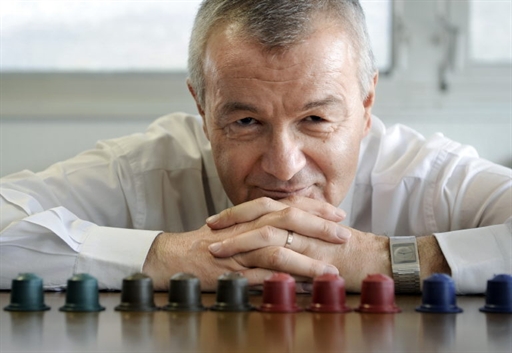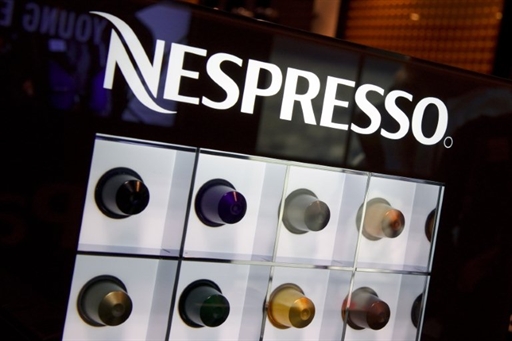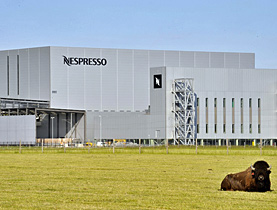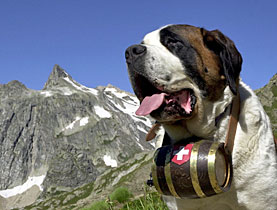Former Nespresso guru takes on his “baby”

Nespresso’s former boss, Jean Paul Gaillard, says he was not motivated by revenge when setting up a rival coffee capsule company.
Brushing aside Nestlé’s legal threats, Gaillard said his Ethical Coffee Company (ECC) will increase production with a new factory in Switzerland after recently receiving a €50 million (SFr66 million) investment boost.
Canton Valais-born Gaillard was credited with turning around Nestlé’s coffee capsule business when he served as chief executive of Nespresso from 1988 until 1998. Nespresso now dominates the market with its high end product achieving 22 per cent sales growth last year to SFr2.77 billion ($2.8 billion).
Gaillard challenged Nestlé’s dominance in May by releasing cheaper, biodegradable pods into the market that can be used in Nespresso machines. Nestlé has responded by starting legal proceedings against ECC – and another rival, Sara Lee – for alleged patent violations.
Speaking to swissinfo.ch from the ECC headquarters in Fribourg, Gaillard said he was motivated more by the challenge of starting up a new venture than by enjoying the luxurious, but less stimulating, trappings of high office in a multi-national company.
“I am fed up with people writing that I am in this for revenge,” he said. “When I saw something that [Nestlé] hadn’t seen, I wondered whether to take the opportunity – because [Nespresso] was my baby. But then I thought: business is business and it is good for the Earth.”
Inheriting the Earth
According to Gaillard, that “something” unseen was the ability to tap into the mid-price range, environmentally conscious market and a gap in the 1,700 patents protecting Nestlé’s product.
Gaillard insists that the environment is a matter that is close to his heart. “I have four children and the youngest is five and a half. In 30 or 40 years time, he is going to be around when I will probably not be,” he told swissinfo.ch.
“When you look at the state of the Earth that we will leave [the next generation] it is a disaster.”
Gaillard’s conviction about winning a patent fight could well be put to the test in the courtroom. A month after ECC launched its products in France, Nestlé had a sample batch of capsules seized by the French authorities as contraband goods.
Gaillard described the action as “intimidation” and dismissed legal threats as little more than a storm in a tea cup. “By law, [Nestlé] have to pay what they seize but we gladly offer them for free,” he told swissinfo.ch.
Nestlé said it welcomed fair competition, but would “take appropriate steps” to defend its intellectual property. “We leverage our science to innovate and keep ahead of our competition. So when our innovation is infringed, it follows that we defend our rights,” the company said in a statement.
Entering the lion’s den
Undaunted by a potential clash with the lawyers of a heavyweight corporation, Gaillard said he would use a fresh €50 million cash injection from investors to build a second production facility.
The choice of preferred venues to complement an existing site in Chambéry in France are Charmilles or Fribourg in Switzerland.
Current production of more than 100 million capsules per year will soon be upgraded to 300-400 million with new machines in Chambéry. Gaillard said production will soon reach “billions” of capsules to meet orders that have reached well in excess of four billion.
ECC also plans to sell pods in other markets, including Switzerland. Gaillard believes Swiss retailers will not be put off stocking ECC pods for fear of reprisals from Nestlé. “The balance of power between distributor and manufacturer has shifted towards distributors,” he said.
Opinion among analysts is split as to whether Nestlé’s dominant position can be eroded by the emerging competition. It appears to boil down to whether ECC and other competitors can persuade consumers of Nespresso’s high end product that they will not compromise on quality and taste if they pay less.
Nestlé fighting back
Food consultant James Amorosa earlier this year told swissinfo.ch that he doubted if Nespresso consumers cared as much about price as quality.
However, Brian Morgan, a beverages analyst at Euromonitor International, believes there is demand for cheaper capsules and that Nespresso will find it harder to distinguish the superiority of its product now that rival pods can be used in its own high quality machines.
“While the lead they have built is likely to be safe in the short term, Nestlé will likely need to take new steps to meet this threat, through more exclusive offerings, expansion into supermarkets, or legal options to defend their patents,” he said in a report.
In the meantime, Nestlé is not standing still as the competition mounts. Having opened a new production facility last year, the company also plans to expand the number of boutique shops, step up efforts to recycle its aluminium pods and produce better machines.
Nestlè was the first company to introduce a high quality espresso style coffee capsule product to the market in 1986 – 10 years after filing initial patents.
Nespresso’s initial launch met with only modest success, but was boosted by a new strategy that aimed the product at the high end sophisticated market.
Nespresso has become established as an iconic consumer brand with a range of machines and pods available to buy online or through a growing number of boutique shops. Customers can also join an exclusive Nespresso club.
The engagement of Hollywood star George Clooney to promote the brand has further boosted Nespresso’s image.
As the Nespresso brand took off, rival companies were quick to produce their own machines and pods at cheaper prices, but Nespresso continues to dominate the market based on a reputation for higher quality.
The arrival of new rival capsules that can be used in Nespresso machines threatens to more seriously challenge Nespresso’s dominance.
A pack of 10 Nespresso capsules generally retails for €3.70 (SFr4.87) while the comparable price for Sara Lee’s L’OR product is €2.99 and for the Ethical Coffee Company’s capsules, €2.60.

In compliance with the JTI standards
More: SWI swissinfo.ch certified by the Journalism Trust Initiative














You can find an overview of ongoing debates with our journalists here . Please join us!
If you want to start a conversation about a topic raised in this article or want to report factual errors, email us at english@swissinfo.ch.